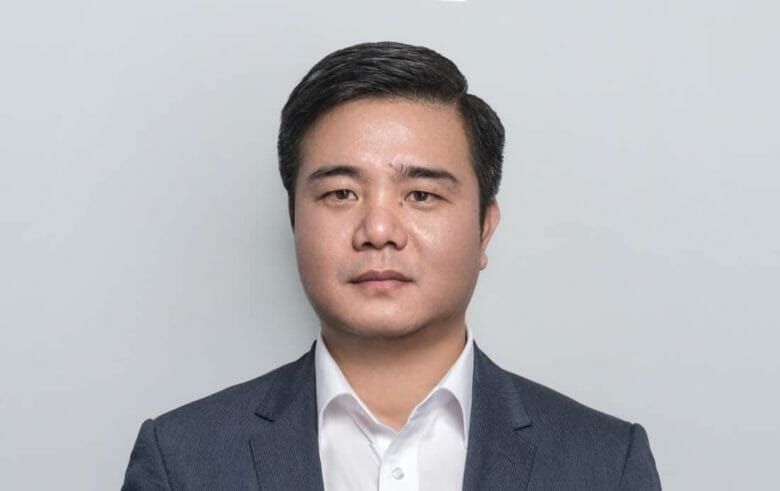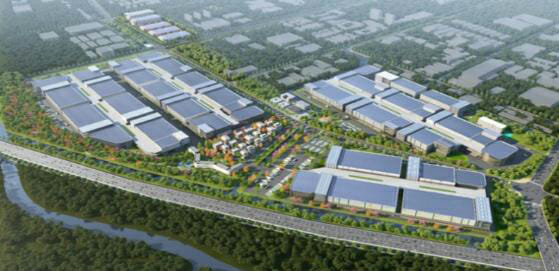DNE Group Gets Nod to List China’s First Privately-Sponsored REIT

DNE Group’s Huaping Kunshan Intelligent Manufacturing Park is just west of Shanghai
A logistics fund sponsored by a Warburg Pincus-backed industrial developer is on track to become China’s first REIT sponsored by a private company after receiving a green light from mainland authorities this past week.
The status of the listing application for D&J New Economy Industrial Park REIT, a RMB 1.38 billion ($200 million) trust, which is sponsored by ESR co-founder Sun Dongping’s DNE Group, was changed to “approved” on Thursday, according to records from Shanghai Stock Exchange’s REITs portal.
“We’re very glad that the D&J New Economy REIT project has been approved. This illustrates a recognition of our capabilities of developing and operating industrial infrastructure,” said Sun, who serves as chairman and chief executive of DNE Group after the company was formed through the merger of D&J and New Ease in December.
Analysts now expect that D&J New Economy Industrial Park REIT, which is based on a portfolio of four Yangtze River Delta industrial parks which were injected into the listed trust by DNE Group, will be listed on the Shanghai exchange in the coming weeks, potentially adding another logistics focused vehicle to the country’s nascent REIT market.
Delta-Focused Vehicle Approved
Getting a green light from the Shanghai Stock Exchange can warrant an imminent REIT debut, with some cases having been approved within six weeks.

DNE Group founder Sun Dongping
For DNE Group’s joint venture partners such as JP Morgan Asset Management and Goldman Sachs Asset Management, REITs will also likely become a new exit channel. JP Morgan signed up for a $600 million logistics JV with New Ease (now part of DNE Group) in May 2020 while Goldman formed a $488 million logistics JV with New Ease last July.
In DNE’s statement on Friday, Sun added that his company expects to further utilize REITs as an avenue to activate its assets and contribute to the development of industrial value chains in the Yangtze River Delta region.
DNE REIT will give investors an opportunity to tap into stable rental income from four industrial parks spanning 284,000 square metres (3 million square feet) in the cities of Shanghai, Kunshan, Wuxi, and Changzhou. The four projects were 100 percent let as of 30 June, according to the prospectus.
That occupancy comes from 45 companies from the sectors of information technology, new materials, high-precision instruments, and electric vehicles. Tenants include Canadian automotive contract maker Magna Steyr in Kunshan and SK Group’s semiconductor machinery parts subsidiary SKC Solmics as well as Nasdaq-listed advanced material maker Lydall Corporation in Wuxi.
Huaping (Jinshan) Intelligent Manufacturing Park, opened in Shanghai’s Jinshan district in June 2016 is the largest and highest value asset in the portfolio, measuring 85,575 squares metres and valued at RMB 445 million. The property’s average rent of RMB 29.98 per square metre per month is also the highest among the four industrial parks.
The annualized capitalization rate of the projects, a measure of return on investment, is estimated to be 6.17 percent for the second half of 2022 and 6.21 percent for 2023. The trust will pay cash dividends at least once per year using not less than 90 percent of its distributable funds, according to the trust’s latest prospectus.
Following the December merger, DNE Group now owns and operates over 110 assets worth over RMB 100 billion with total gross floor area of 12 million square metres across logistics and cold storage, life science and manufacturing parks, urban redevelopment and data centres, according to its website.
Adventures in REIT Listing
The latest version of the trust’s prospectus shows the valuation of the assets to be RMB 1.38 billion ($200 million), down from RMB 1.44 billion from an earlier version filed last month.

Huaping (Jinshan) Intelligent Manufacturing Park is the largest asset in the REIT portfolio
The REIT’s approval came more than ten months after DNE Group first submitted a REIT application together with Shanghai state-owned industrial park developer Lingang Group for a portfolio of six assets.
The original application titled Lingang D&J Intelligent Manufacturing Park REIT had also included Phase I of Lingang Group’s Lingang Fengxian Intelligent Manufacturing Park as well as Phase III of the same park, which is jointly owned by Lingang Group and DNE Group in addition to the four DNE Group assets. Lingang is a suburban area 1.5-hour drive from Shanghai city proper planned by the government to become an EV and semiconductor manufacturing hub.
After Chinese authorities raised a concern that assets controlled by non-related entities were grouped together in one REIT, the applicants split the REIT, with DNE Group’s solely-owned industrial parks shifting into D&J New Economy Industrial Park REIT.
An agreement was also set up in June for a Lingang Group affiliate to lead the decision making of Phase III of the Lingang Fengxian Intelligent Manufacturing Park, hence making Lingang Group the controlling owner of the original REIT. To reflect the changes, the original REIT was renamed the Lingang Innovative Intelligent Manufacturing Park REIT.
Shanghai Stock Exchange approved the listing application for the Lingang REIT Tuesday and for DNE REIT Thursday. Guotai Junan Securities Asset Management is the underwriter for both trusts.
New Fundraising Channel
China launched REITS last June to harness household savings and private capital to spur infrastructure development without outstretching already debt-laden local governments. For fear of stoking asset bubbles, China has so far excluded commercial properties from its REITs and has focused on infrastructure such as toll highways, industrial parks, and data centres.
Last June, Singapore-based GLP became the first international company to list a REIT in China when it teamed up with mainland investment bank CICC to launch GLP C-REIT. The logistics giant raised RMB 5.85 billion through the listing of GLP C-REIT, which owns a portfolio of seven logistics assets with over 700,000 square metres of gross floor area.
Subsidised housing has recently been included in the REIT scheme. Three REITs with public rental housing projects in Xiamen, Shenzhen, and Beijing as their underlying assets rose to the first trading day’s limit of 30 percent on their debut Tuesday.
The three REITs were each more than 100 times oversubscribed among institutional investors and raised a combined RMB 3.8 billion based on Reuters’ calculations.



